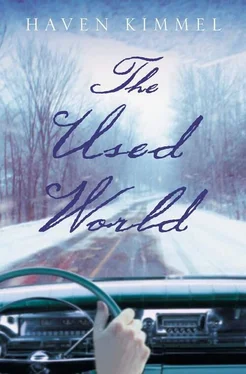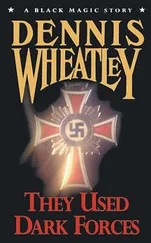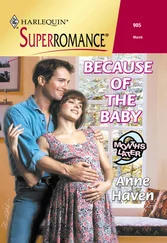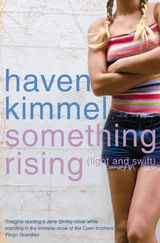The arm of the record player lifted the 45 and dropped it back in place, and the needle settled into the wide opening groove. “Theme from A Summer Place ” began for the third or fourth time, the waltzing melody washing over Hazel as if it really were another season. She and Finney lay on their backs in Hazel’s bed, looking out the window at the bare winter branches, the clouds passing the moon.
“Don’t you love this song?” Finney’s arms were crossed behind her head and she wiggled her toes inside her white socks.
“I do.” Around the room the elephants marched and the circus train faded against the gray walls. Edna’s nursery had been painted pink, with dancing circus ponies in ribbons and flowers, as if Hazel had been invited to one kind of carnival and Edna to another.
“You don’t mean it.” Finney would be blue until she died.
“How do you know?”
Finney shrugged. Hazel turned her head on her pillow and watched Finney’s eyes trace the border of the casement window. “What do you love?” Finney asked, still looking ahead.
I love—Hazel thought—your parents’ farm and the tone of voice you use with animals. I love that you have stolen your father’s cardigan and made it look like the most feminine sweater in the world. I love the way your curls hang against your neck, and how you are the one true thing I’ve ever known, and how if I were captured by pirates and didn’t see you for a hundred years I’d still recognize any part of you, even an elbow. “I love Johnny Cash. I love the music from the war and from before the war. I love The Steve Allen Show and the smell of kid leather in my mother’s car. Oh, and toasted marshmallows.”
“That’s a lot.”
“The world is full of riches.” Hazel settled back into her pillow. “Have you seen him lately? I mean, actually seen him?”
Finney gave Hazel a nervous glance, an unhappy smile. “My parents had gone to get some grain for the horses, and he found me skating on the pond. I was by myself, I looked ridiculous. I was wearing Dad’s overcoat with the raccoon collar, the one he had his only year at Purdue, and a white hat I knitted last winter, and a yellow and blue woolly scarf wrapped around and around my neck, all the way over my chin. My skates are even dingy. I’m sure my nose was bright red from the cold.”
“When was this?” Hazel couldn’t keep the blade off each word, the edge that told everything about how lost she was, how scared she was to think of Finney with no need of her, carving figure eights into her frozen cow pond, which in the summer was thick with algae and mosquito larvae. And also what was under the ice, and what would happen if Finney should go there.
“Three days ago? Maybe.”
Hazel said to herself, Don’t ask, don’t ask, then asked, “Where was I?” Not plaintive, not demanding. She tried to make the inquiry casual, to suggest a passing puzzlement over her own agenda, three days ago. But how could the question not contain the other times she’d asked it, when Finney had seen a movie without her, when Finney showed up at school with pale pink lips instead of coral, and where did the coral go? Where did she find the pale pink, who shopped with her? When Finney, for instance, suddenly loved “Theme from A Summer Place ” and last week had loved “Only the Lonely”? Where was poor Roy Orbison now, with his ugly glasses and slow-dance opera?
“I don’t know.” Finney bit her thumbnail, seemed not to give Hazel’s whereabouts on ice-skating day a second thought. “He didn’t approve of me skating.”
“No, I wouldn’t think so.”
“He asked what would happen if I fell and got really hurt while my parents were gone.”
The arm of the record player lifted in hopeless repetition, and Hazel tried to keep her breathing steady. Time was he didn’t talk to Finney that way, didn’t suggest any tenderness. This was new, his fear, and it was akin to Hazel’s own.
“What did you say?”
“I told him I’m indestructible. Then I skated backward around the pond twice and he stood completely still watching, right up until I skated into him and we both fell and he hurt his hip and I hurt my wrist.” She raised her eyebrows at Hazel, warm with irony and in full possession of the memory. She was resurrected, the now gone Finney of three days ago, and Hazel could see the coat and hat, the bright scarf, Finney’s long limbs and neck, how graceful she was for such a tall girl. There he was, too, standing on the ice, worried and angry and miserable (so much a part of his charm), watching Finney glide like a carved figure over the mirror of a music box. It would have been a moment outside of time for both of them, and then the sudden physical awakening of her body against his, the swift transport back into the rudeness of winter on an Indiana farm, the love he couldn’t have. Finney’s smell of sleep and tea.
“And then what happened?”
“We helped each other up. I brushed him off, he brushed me off, he kissed me once, so hard my teeth nearly went through my lips, then he walked fast away. I tried to follow him and he told me to go home.” Finney blinked, her eyelashes damp with tears, and Hazel could see Finney was happy to be so sad, because he had made her sad, he had sent her away. In turning his back to her, he had told her something intimate and they shared it now, and the most Hazel could wish for was to witness it. “Do you hear a car?” Finney asked, raising her head.
Hazel sat up, glanced at the clock. Her parents weren’t due home for three more hours. “We’ve got to clean up the kitchen and fold the laundry.” She hopped around, pulling her shoes on. Finney stood up, stretched, languid as a cat. Her parents were kind, permissive, sloppy. They let her bake cookies when she and Hazel were barely old enough to turn on the stove. Nobody cared about the mess. On Sundays in the winter, after the livestock were fed, Finney’s dad, Malcolm, came home and put his pajamas back on, drank hot chocolate, and listened to the radio, letting the sections of the newspaper pile up around him. Their house wasn’t a museum or a testament to anything. Just a house.
“Hazey, that isn’t your dad’s car.”
Headlights were more than halfway down the lane, and Finney was right—it wasn’t the Cadillac. Hazel bent over, tied her shoes. She ran her fingers through her hair, pulled it into a ponytail, and wrapped it with a rubber band from her wrist. Finney, too, sped up, tying her shoes and straightening her sweater. “You expecting someone?” she asked.
“No. Are you?” It would be unbearable if she’d invited him here.
“Hardly. He wouldn’t come if I invited him to a church social.”
The car pulled up in front of the house, and in the sodium light Hazel almost recognized it. It was someone who had been there before, and recently. Yesterday?
The brass doorknob of her bedroom door was cold; the pattern of the hallway rug was a thousand eyes. Hazel turned left and Finney was behind her, humming. They went down the front staircase, passing the silvery ancestors, through the front parlor, past the wide front door with the leaded glass panes, to the side entrance with the heavy lock and the screen. Neither thought to take a coat. They walked out into a bitterly cold, windless December night just as the car pulled into one of the clinic parking spaces and stopped. A man jumped from the driver’s side, shouting, “Miss Hunnicutt, where’s your mama?”
Hazel and Finney stopped on the porch, squinted into the dark to take him in. “Jerome? Is that you?”
“I need your mama, Miss Hazel. Lorraine isn’t doing good, she’s bleeding, where’s Mrs. Hunnicutt?” The young man covered the distance between his car and the porch in two long strides: Jerome Wilson, who played center for the Southside Wildcats, a local star, and Negro.
Читать дальше












